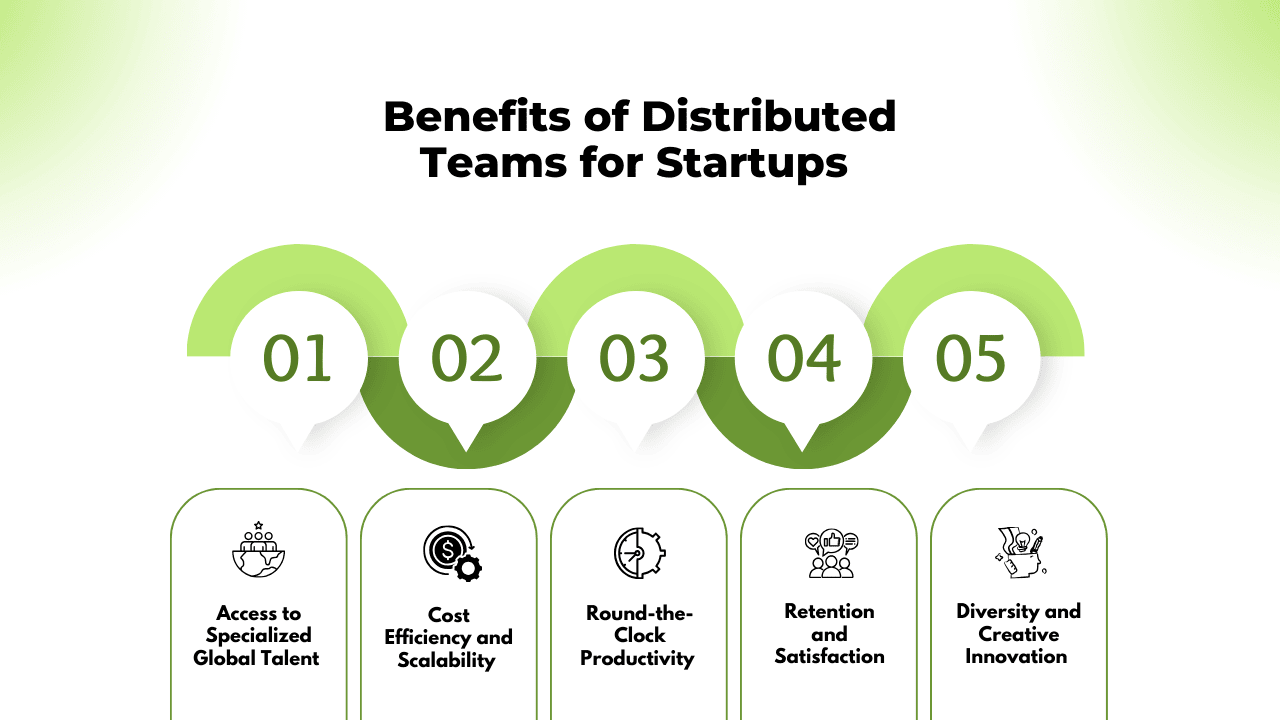Faster Growth, Smarter Teams: Why Creative Startups Embrace Distributed Workforces

Creative startups from design agencies to tech innovators are embracing distributed teams to fuel growth. They are no longer an experimental trend, they’ve become a proven framework for productivity and growth. The distributed model empowers startups to access specialized global talent, operate with leaner cost structures, and build around-the-clock workflows that accelerate product launches.
This blog explores the strategic benefits of distributed teams for startups and why nearshore markets like Argentina are emerging as key hubs for sourcing high-quality, affordable talent.
Chapters
Benefits of Distributed Teams for Startups

For modern startups, distributed teams have evolved from a workplace experiment into a proven strategy for accelerating growth and innovation.
Access to Specialized Global Talent
Startups often need niche skills from AI engineers to UX designers, which may be scarce locally. A distributed model opens the door to worldwide expertise, allowing founders to hire the right people at the right time. Companies like GitLab have demonstrated how global hiring dramatically expands access to top-tier professionals.
Cost Efficiency and Scalability
Hiring globally often means accessing skilled talent at more competitive rates, especially in nearshore regions. Combined with savings on office space, relocation, and overhead, startups can scale their teams faster without burning through capital. This lean structure appeals to investors who value efficient growth models.
Round-the-Clock Productivity
Distributed teams spread across time zones allow projects to progress continuously. While one group finishes its workday, another begins, reducing development cycles and speeding up product launches. This “follow-the-sun” workflow is particularly powerful for creative and technical projects that require rapid iteration.
Retention and Satisfaction:
Employees greatly value flexibility. HBR finds that offering remote work is seen as worth roughly an 8% salary increase by workers, and it can slash turnover by up to 35% for startups. This translates into lower recruitment costs and stronger team loyalty.
Diversity and Creative Innovation
Innovation thrives on diversity of thought. By assembling teams across different geographies and cultures, startups gain fresh perspectives and creative problem-solving approaches that a single-region team cannot provide. This diversity often sparks unique ideas that help startups stand out in competitive markets.
Driving Faster Growth With Distributed Teams

The speed of growth is often the difference between capturing market share and being left behind. Distributed teams enable founders to scale rapidly without the traditional barriers of location, cost, and limited talent supply. By embracing this model, startups can accelerate innovation and execution in several ways:
Rapid Team Building:
Founders can hire remote experts quickly through global networks. Connecting with global recruitment specialists, such as Argentina IT recruiting by Tangonet Solutions, allows startups to quickly identify and onboard skilled developers, designers, and marketers.
This agility lessens hiring cycles from months to weeks, giving startups the manpower they need exactly when they need it.
24/7 Development:
Teams working across time zones keep projects moving around the clock. While one subgroup rests, another advances the project, which shortens development sprints, speeds up feedback loops, and brings products to market sooner.
Effective Collaboration:
Modern tools (Slack, Zoom, project trackers) keep virtual teams aligned. Studies show remote workers often complete more tasks and report high satisfaction, meaning distributed teams can deliver more without extra overhead.
Flexibility and Resilience:
Remote staffing lets startups flex their workforce up or down as needed. If a quick pivot is required, companies can add freelance specialists in days rather than rebuild whole local teams in weeks.
In fact, a ResearchGate study found that 65% of remote workers report being “extremely satisfied” with their jobs, compared to just 34% of office-based employees, ensuring flexible teams remain motivated and productive during periods of rapid change. This combination of efficiency and engagement allows startups to scale faster, adapt quickly, and stay competitive in fast-moving markets.
Lean Operations:
A remote-first model keeps overhead low. Companies report that WFH policies boost retention and slash facility costs. This lean approach extends the runway and appeals to investors who favor efficient, high-velocity teams. Moreover, remote employees often work focused hours (skipping commutes), so overall productivity per person can rise.
The Argentina Nearshore Advantage
For many U.S. and global startups, Latin America is a favored source of tech talent, especially Argentina. Building a strong team quickly can be a major challenge. Argentina offers a practical solution. With a talented, creative workforce and a tech ecosystem that thrives on innovation, startups can tap into skilled professionals who integrate seamlessly, helping projects move faster and growth happen without the usual hurdles.
Its advantages include:
Skilled Talent Pool:
Argentina consistently produces thousands of skilled graduates in computer science, design, and engineering each year. Its tech community has a reputation for innovation, problem-solving, and adaptability, qualities essential for startups seeking creative solutions at speed.
Lower Costs:
Because living expenses are lower, Argentine developers command much lower salaries than U.S. peers. This cost-effectiveness means startups can afford larger or more experienced teams on a limited budget.
Trusted Recruiting Partners
Specialized agencies, such as Tangonet Solutions, make it easier for startups to tap into Argentina’s talent pool. By managing sourcing, vetting, and onboarding, they help young companies build reliable nearshore teams without the complexity of local hiring.
Cultural Fit & Support:
Many Argentine professionals speak fluent English and are well-versed in Western work norms. This reduces miscommunication and makes integration with U.S. startup culture seamless.
Creative Synergy:
By combining diverse cultural perspectives with entrepreneurial drive, teams can craft distinctive apps, campaigns, and media projects that resonate with broader audiences. This cross-border collaboration doesn’t just add efficiency, it injects originality and fresh ideas that fuel long-term competitive advantage.
Conclusion
Distributed teams have become a strategic advantage for startups, enabling faster innovation, access to specialized global talent, and flexible, scalable operations. Beyond cost savings, they foster creative collaboration, round-the-clock productivity, and resilience in an ever-changing market. Startups that embrace distributed models strategically with the right tools, processes, and culture position themselves to grow faster, innovate continuously, and maintain a competitive edge.
Writer Bio
 Arsen Harutyunyan is a co-founder of Semlead and a freelance link-building and digital PR specialist who helps SaaS companies and growing brands earn high-authority coverage and appear in LLM results (ChatGPT, Perplexity, AI Overviews). He combines proven SEO strategies with innovative workflows, such as Google Sheets + GPT automations, to build links at scale, drive sustainable traffic, and future-proof brands in the era of AI-powered search. Chat with Arsen on Upwork
Arsen Harutyunyan is a co-founder of Semlead and a freelance link-building and digital PR specialist who helps SaaS companies and growing brands earn high-authority coverage and appear in LLM results (ChatGPT, Perplexity, AI Overviews). He combines proven SEO strategies with innovative workflows, such as Google Sheets + GPT automations, to build links at scale, drive sustainable traffic, and future-proof brands in the era of AI-powered search. Chat with Arsen on Upwork
Other Interesting Articles
Master the Art of Video Marketing
AI-Powered Tools to Ideate, Optimize, and Amplify!
- Spark Creativity: Unleash the most effective video ideas, scripts, and engaging hooks with our AI Generators.
- Optimize Instantly: Elevate your YouTube presence by optimizing video Titles, Descriptions, and Tags in seconds.
- Amplify Your Reach: Effortlessly craft social media, email, and ad copy to maximize your video’s impact.
The post Why Creative Startups Turn to Distributed Teams for Faster Growth appeared first on StoryLab.ai.


Deixe um comentário